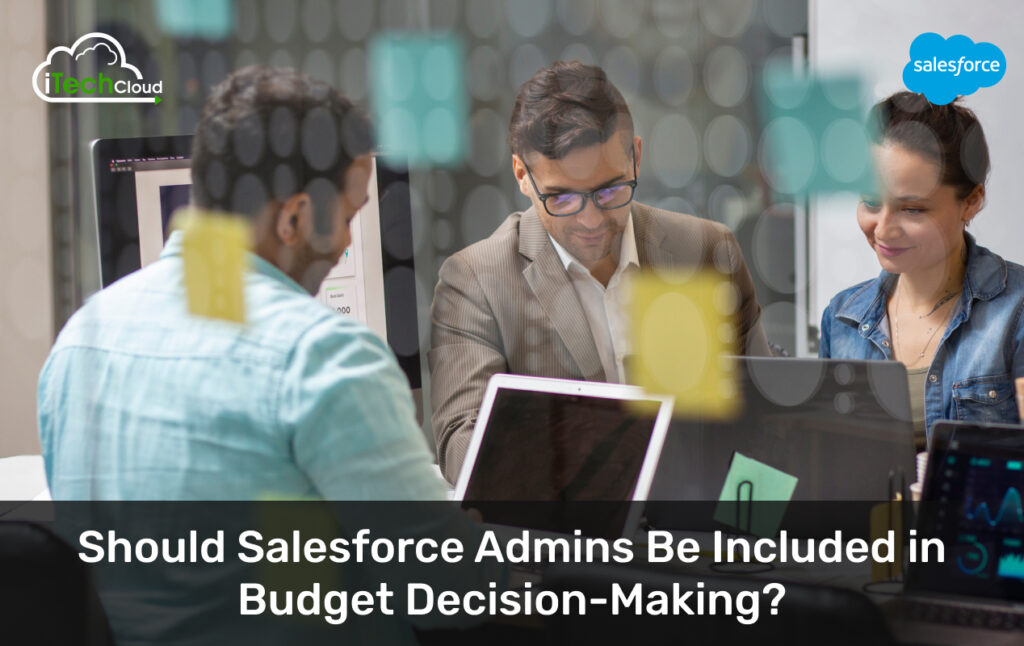Should Salesforce Admins Be Included in Budget Decision-Making?

Introduction
Budget decision-making is a critical aspect of any organization’s success. Traditionally, financial planning has been the domain of executives, finance teams, and department heads. However, as businesses increasingly rely on technology platforms like Salesforce to drive operations, the role of Salesforce Administrators (Admins) has expanded beyond system maintenance.
Salesforce admins are the backbone of CRM efficiency, ensuring that the platform aligns with business needs. But should they also have a seat at the budget table? This blog explores why including Salesforce Admins in budget discussions can lead to better financial decisions, improved ROI, and more strategic technology investments.
Table of Contents
The Evolving Role of Salesforce Admins
Salesforce admins are no longer just technical support staff they are strategic partners who understand:
- Business Processes: How different departments use Salesforce.
- System Limitations & Opportunities: Where the platform excels and where third-party tools may be needed.
- User Adoption & Training Needs: What investments will maximize efficiency?
Given their hands-on experience, admins can provide valuable insights into cost-saving measures, necessary upgrades, and potential inefficiencies.
Why Salesforce Admins Should Be Involved in Budget Planning
1. They Understand the True Cost of Salesforce Ownership
Salesforce is not just about licensing fees. Additional costs include:
- Third-party integrations (e.g., marketing automation, CPQ tools).
- Storage and data management (extra costs for exceeding limits).
- Training and change management (ensuring user adoption).
Admins can forecast these expenses more accurately than finance teams unfamiliar with day-to-day platform needs.
2. They Can Identify Cost-Saving Opportunities
Admins know:
- Underutilized licenses that can be reclaimed.
- Redundant apps that can be replaced with native Salesforce features.
- Automation opportunities that reduce manual work (and labor costs).
Without their input, companies may overspend on unnecessary tools or miss optimization chances.
3. They Ensure Budget Alignment with Business Goals
Admins bridge the gap between IT and business units. They can:
- Prioritize budget allocations based on departmental needs.
- Advise on ROI-driven investments (e.g., new Salesforce features vs. custom development).
- Prevent budget waste by avoiding unused or poorly implemented solutions.
4. They Improve Vendor Negotiations
Salesforce admins can:
- Evaluate whether a vendor’s solution is truly necessary.
- Assess alternative solutions (e.g., AppExchange apps vs. custom builds).
- Provide technical input during contract renewals to avoid over-licensing.
5. They Enhance Long-Term Strategic Planning
Budget decisions impact scalability. Admins can:
- Advise on phased rollouts to spread costs.
- Highlight future needs (e.g., AI, analytics, or industry-specific clouds).
- Align Salesforce roadmaps with financial planning.
Potential Challenges & How to Overcome Them
1. Admins May Lack Financial Expertise
Solution: Provide basic financial training or pair them with finance teams for collaborative planning.
2. Resistance from Leadership
Solution: Demonstrate past successes where admin input saved money or improved efficiency.
3. Overwhelming Admins with Non-Technical Tasks
Solution: Ensure budget involvement is strategic, not bureaucratic focus on high-impact decisions.
Best Practices for Including Salesforce Admins in Budget Discussions
Salesforce admins play a crucial role in optimizing costs and ensuring efficient platform usage. To maximize their impact in budget planning, follow these best practices:
1. Invite Them Early
Include admins in budget discussions before final decisions are made. Their insights on licensing, integrations, and system needs can prevent overspending and identify cost-saving opportunities.
2. Encourage Cross-Department Collaboration
Foster communication between admins, IT, finance, and business teams. This ensures budget decisions align with both technical capabilities and business goals.
3. Data-Driven Insights
Use Salesforce reports and usage analytics to justify budget requests. Admins can highlight underutilized licenses, redundant apps, or automation opportunities that reduce costs.
4. Set Clear Expectations
Define the admin’s role in financial planning. Clarify whether they provide recommendations, assist in vendor negotiations, or help forecast future expenses.
5. Recognize Their Contributions
Showcase how their input leads to savings or efficiency gains. This reinforces their value and encourages continued collaboration.
Real-World Examples
Case Study 1: Reducing Licensing Costs
A company discovered through its Salesforce admin that 20% of its licenses were unused. By reclaiming and reallocating them, they saved $50,000 annually.
Case Study 2: Avoiding Costly Custom Development
An admin identified a native Salesforce feature that could replace a $30,000/year third-party tool, leading to immediate savings.
My Takeaway:
Salesforce admins bring a unique, operational perspective to budget discussions. Their insights can prevent wasteful spending, optimize investments, and align financial decisions with business objectives. While challenges exist, companies that integrate Admins into financial planning will see stronger ROI from their Salesforce investments.

